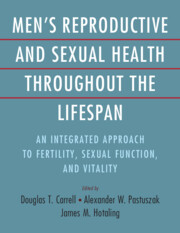 Men's Reproductive and Sexual Health Throughout the Lifespan
Men's Reproductive and Sexual Health Throughout the Lifespan Book contents
- Men’s Reproductive and Sexual Health throughout the Lifespan
- Men’s Reproductive and Sexual Health throughout the Lifespan
- Copyright page
- Contents
- Contributors
- Preface
- Section 1 An Introduction to Men’s Health Care
- Section 2 The Biology of Male Reproduction and Infertility
- Section 3 Clinical Evaluation and Treatment of Male Infertility
- Chapter 12 Office Evaluation of the Infertile Male
- Chapter 13 Medical Management of Male Infertility
- Chapter 14 Surgical Management of Male Infertility
- Chapter 15 Varicocele Repair in the Era of IVF/ICSI
- Chapter 16 Implementing Genetic Testing of Male Infertility in the Clinic
- Chapter 17 Andrological Care of the Patient with Spinal Cord Injury
- Chapter 18 Clinical Fertility Preservation Decision-Making for Prepubertal and Postpubertal Individuals with Male Gametes
- Chapter 19 Mental Health Considerations in the Infertile Male and Couple
- Section 4 Laboratory Evaluation and Treatment of Male Infertility
- Section 5 Medical and Surgical Management of Issues of Male Health
- Index
- References
Chapter 16 - Implementing Genetic Testing of Male Infertility in the Clinic
from Section 3 - Clinical Evaluation and Treatment of Male Infertility
Published online by Cambridge University Press: 06 December 2023
- Men’s Reproductive and Sexual Health throughout the Lifespan
- Men’s Reproductive and Sexual Health throughout the Lifespan
- Copyright page
- Contents
- Contributors
- Preface
- Section 1 An Introduction to Men’s Health Care
- Section 2 The Biology of Male Reproduction and Infertility
- Section 3 Clinical Evaluation and Treatment of Male Infertility
- Chapter 12 Office Evaluation of the Infertile Male
- Chapter 13 Medical Management of Male Infertility
- Chapter 14 Surgical Management of Male Infertility
- Chapter 15 Varicocele Repair in the Era of IVF/ICSI
- Chapter 16 Implementing Genetic Testing of Male Infertility in the Clinic
- Chapter 17 Andrological Care of the Patient with Spinal Cord Injury
- Chapter 18 Clinical Fertility Preservation Decision-Making for Prepubertal and Postpubertal Individuals with Male Gametes
- Chapter 19 Mental Health Considerations in the Infertile Male and Couple
- Section 4 Laboratory Evaluation and Treatment of Male Infertility
- Section 5 Medical and Surgical Management of Issues of Male Health
- Index
- References
Summary
Male factor infertility contributes to roughly 50% of the causes of infertility among couples. Advancements in the diagnostic field of reproduction allowed for the recognition of various etiologies for male factor infertility. Various pretesticular, testicular, and posttesticular etiologies have been identified and are believed to arise from genetic causes in 15–30% of cases. While a number of laboratory tests are available, the indication of genetic testing relies primarily on the findings in the history, physical examination, and semen analysis. Men with suspicion of nonobstructive azoospermia and those with idiopathic severe oligozoospermia are investigated with karyotype and Y-chromosome microdeletion assays. Analysis of the cystic fibrosis transmembrane conductance regulator (CFTR) gene is reserved for patients with obstructive azoospermia secondary to a unilateral or bilateral complete absence of the vas deference. In addition to the more commonly adopted tests, the genetic evaluation may have a role in patients with congenital hypogonadotropic hypogonadism and androgen insensitivity syndrome. Genetic testing of male infertility is a rapidly evolving field in andrology. Epigenetics, next-generation DNA sequencing, and microarray-based technologies represent some of the promising development in the area and may further expand the clinical utilization of genetic evaluation.
- Type
- Chapter
- Information
- Men's Reproductive and Sexual Health Throughout the LifespanAn Integrated Approach to Fertility, Sexual Function, and Vitality, pp. 127 - 134Publisher: Cambridge University PressPrint publication year: 2023
